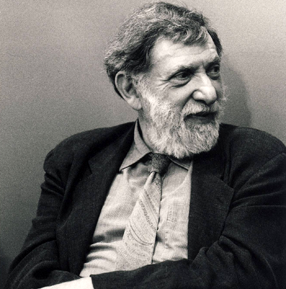The Mad Potter
Now at the turn of the year this coil of clay Bites its own tail: a New Year starts to choke On the old one's ragged end. I bite my tongue As the end of me—of my rope of stuff and nonsense (The nonsense held, it was the stuff that broke), Of bones and light, of levity and crime, Of reddish clay and hope—still bides its time. Each of my pots is quite unusable, Even for contemplating as an object Of gross unuse. In its own mode of being Useless, though, each of them remains unique, Subject to nothing, and themselves unseeing, Stronger by virtue of what makes them weak. I pound at all my clay. I pound the air. This senseless lump, slapped into something like Something, sits bound around by my despair. For even as the great Creator's free Hand shapes the forms of life, so—what? This pot, Unhollowed solid, too full of itself, Runneth over with incapacity. I put it with the others on the shelf. These tiny cups will each provide one sip Of what's inside them, aphoristic prose Unwilling, like full arguments, to make Its points, then join them in extended lines Like long draughts from the bowl of a deep lake. The honey of knowledge, like my milky slip, Firms slowly up against what merely flows. Some of my older pieces bore inscriptions That told a story only when you'd learned How not to read them: LIVE reverted to EVIL, EROS kept running backwards into SORE. Their words, all fired up for truth, got burned. I'll not write on weak vessels any more. My juvenalia? I gave them names In those days: Hans was all handles and no spout; Bernie believed the whole world turned about Himself alone; Sadie was close to James (But Herman touched her bottom when he could); Paul fell to pieces; Peter wore away To nothing; Len was never any good; Alf was a flat, random pancake, May An opened blossom; Bud was an ash-tray. Even their names break off, though; Whatsisface, That death-mask of Desire, and—you know!— The smaller version of that (Oh, what was it?— You know . . .) All of my pots now have to go By number only. Which is no disgrace. Begin with being—in an anagram Of unending—conclude in some dark den; This is no matter. What I've been, I am: What I will be is what I make of all This clay, this moment. Now begin again . . . Poured out of emptiness, drop by slow drop, I start up at the quarreling sounds of water. Pots cry out silently at me to stop. What are we like? A barrelfull of this Oozy wet substance, shadow-crammed, whose smudges Of darkness lurk within but rise to kiss The fingers that disturb the gently edges Of their bland world of shapelessness and bliss. The half-formed cup cries out in agony, The lump of clay suffers a silent pain. I heard the cup, though, full of feeling, say "O clay be true, O clay keep constant to Your need to take, again and once again, This pounding from your mad creator who Only stops hurting when he's hurting you." What will I then have left behind me? Over The years I have originated some Glazes that wear away at what they cover And weep for what they never can become. My Deadware, widely imitated; blue Skyware of an amazing lightness; tired Hopewear that I abandoned for my own Good reasons; Hereware; Thereware; ware that grew Weary of everything that earth desired; Hellware that dances while it's being fired, Noware that vanishes while being thrown. Appearing to be silly, wisdom survives Like tribes of superseded gods who go Hiding in caves of triviality From which they laughingly control our lives. So with my useless pots: safe from the blow Of carelessness, or outrage at their flaws, They brave time's lion and his smashing paws. —All of which tempts intelligence to call Pure uselessness one more commodity. The Good-for-Nothing once became our Hero, But images of him, laid-back, carelessly Laughing, were upright statues after all. From straight above, each cup adds up to zero. Clay to clay: Soon I shall indeed become Dumb as these solid cups of hardened mud (Dull terra cruda colored like our blood); Meanwhile the slap and thump of palm and thumb On wet mis-shapenness begins to hum With meaning that was silent for so long. The words of my wheel's turning come to ring Truer than Truth itself does, my great Ding Dong-an-sich that echoes everything (Against it even lovely bells ring wrong): Its whole voice gathers up the purest parts Of all our speech, the vowels of the earth, The aspirations of our hopeful hearts Or the prophetic sibilance of song.
Credit
From Harp Lake, by John Hollander, published by Alfred A. Knopf. Inc. Copyright © 1988 by John Hollander. Used with permission.
Date Published
01/01/1988

